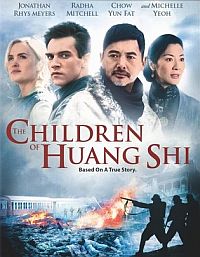
|
|
|
The Children of Huang Shi
Based on true events, The Children of Huang Shi tells the story of George Hogg (Jonathan Rhys Meyers), a British journalist who travels to Shanghai in 1938 to document the Japanese occupation of China during World War II. Based in Shanghai -- an area left nearly untouched by the Japanese -- Hogg wants to find out what's really going on, and he so disguises himself as an aid worker in order to go behind Japanese lines. Upon reaching Nanjing, Hogg witnesses civilians being massacred, and almost becomes a victim himself before being saved by the revolutionary Chen Han-Sheng (Chow Yun-Fat).
Unable to make it back to Shanghai, Chen sends Hogg to an orphanage in the village of Huang Shi, where, aided by an American nurse (Rhada Mitchell) and a black market dealer (Michelle Yeoh), he rebuilds the orphanage and becomes a father figure to the children. Things seem to be safe, but when the Japanese draw near, Hogg decides he must bring the children on a dangerous journey to the outskirts of China's Gobi desert, where he hopes they will finally be safe.
The Children of Huang Shi drew a bit of controversy because of its' loose re-telling of the historical events. Most notably, there is a major omission in the guise of Rewi Alley, a New Zealand writer who was the one that actually formed the orphanage and came up with the plan to save the children. It is not known exactly why Alley's role in the story was cut, but it seems to be a matter of pleasing the international group of producers and dependence of the Chinese market. Alley was a homosexual, something that Mainland censors certainly do not like. And most likely, the American suits thought the fact that Alley was an unrepentant communist wouldn't sit well with US audiences.
At any rate, when it boils down to the actual film itself taken on its' own, The Children of Huang Shi is a mixed bag. Roger Spottiswoode has a knack for delivering solid historical movies, like 1993's And The Band Played On -- which was ironically, given Alley's omission from the story here, one of the first mainstream films to deal seriously about AIDS and how it affected the gay community. He's also shown, as with the James Bond picture Tomorrow Never Dies that he can deliver exciting action sequences.
And certainly, Spottiswoode does touch on those two extremes of his body of work here. There are some scenes which vividly deliver the explosive violence of the Japanese occupation, and some others which generate some genuine emotion. The Children of Huang Shi's main problem is that there's nothing really here that hasn't been done before. Besides a bit of wooden acting at parts from Meyers and Mitchell, there's really nothing which you can point at for being really bad, but on the other hand, there's not much that one can focus on as being truly good, either.
The Children of Huang Shi is perfectly serviceable enough, and will probably become a mainstay of some cable station's Saturday night schedule, probably Lifetime or WE, given its' penchant for scenes that are obviously induced to making people grab for hankies. Does that make it a bad film? No. But it doesn't exactly make it anything worth fans of Hong Kong movies to seek out anytime soon, and that is why it only draws a very mild recommendation for those potential viewers who might come across it in their cinematic travels. RATING: 5 |